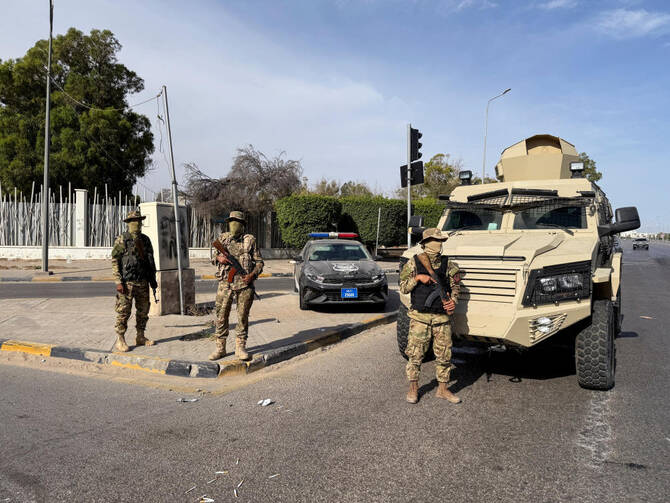TRIPOLI: Fresh gunbattles erupted on Wednesday in the Libyan capital between two powerful armed groups, a security official said, a day after authorities declared the fighting over.
Clashes flared between the Radaa force and the 444 Brigade in key areas of the city, including the port, the source said.
Fighting eased toward the end of the day, according to television reports and residents who spoke to AFP, with some bakeries opening but schools remaining shut.
No official casualty figures were released, but the Libyan Red Crescent said it had recovered a dead body from a major street in Tripoli.
On Monday night, heavy arms fire and explosions rocked several Tripoli districts, killing at least six people, according to authorities.
The official described the fighting as “urban warfare,” with clashes in residential areas involving light and medium weapons. In other areas, heavy weapons were used.
Libya has struggled to recover from the NATO-backed 2011 uprising that toppled and killed longtime leader Muammar Qaddafi.
The country remains split between a UN-recognized government in Tripoli, led by Prime Minister Abdulhamid Dbeibah, and a rival administration in the east, controlled by the Haftar family.
The 444 Brigade controls parts of southern Tripoli and is aligned with Dbeibah. Radaa controls parts in the capital’s east and holds several key state facilities.
Fighting extended in southern and western Tripoli as Radaa brought in reinforcements to fight the 444 Brigade, an interior ministry source said.
More than 500 people on Wednesday rallied in the Souq el-Joumaa neighborhood, a Radaa stronghold, chanting slogans against the Dbeibah government and denouncing the proposed dissolution of the 444 Brigade.
Reports said Abdelghani Al-Kikli, leader of the Support and Stability Apparatus which controls the southern district of Abu Salim, was killed this week at a facility controlled by the 444 Brigade.
A source told AFP that groups were moving into the capital from neighboring Zawiya in support of Radaa, which detains smugglers of drugs and alcohol as well as affiliates of the Daesh group.
Meanwhile, “more Misrata brigades may continue to join Dbeibah’s side,” said Libya expert Jalel Harchaoui.
He described the latest conflict as some of the most dangerous for the capital in recent years, saying it meant a “territorial reshuffle” with more factions “seeking to insinuate themselves into downtown Tripoli.”
Turkiye, a supporter of the Tripoli-based government, called on “all parties to implement a full and lasting ceasefire without delay and to engage in dialogue to settle disputes,” its foreign ministry said.
On Tuesday, the Tripoli-based government said the fighting had been controlled. Dbeibah thanked government forces “for restoring security and asserting the state’s authority in the capital.”
Dbeibah also announced a string of executive orders including dissolving some bodies previously run by Tripoli armed groups other than the 444 Brigade.
But a second night of fighting could mean “a more prolonged, destructive, and existential battle with a nationwide dimension” after what he said was Dbeibah’s “failure to secure a quick victory.”
Authorities also announced a ceasefire, but gunshots were still heard in western parts of Tripoli.
The embassies in Germany, France the United States, Britain and Italy on Wednesday evening expressed “their deep concern about the recent violence in Tripoli,” urging the “authorities to take all measures to protect civilians” in a statement.
The United Nations mission in Libya said it was “deeply alarmed by escalating violence in densely populated neighborhoods of Tripoli for the second night in a row.”
In a statement, it called for “an immediate, unconditional ceasefire in all areas, allowing safe corridors for the evacuation of civilians trapped in intense conflict zones.”




























